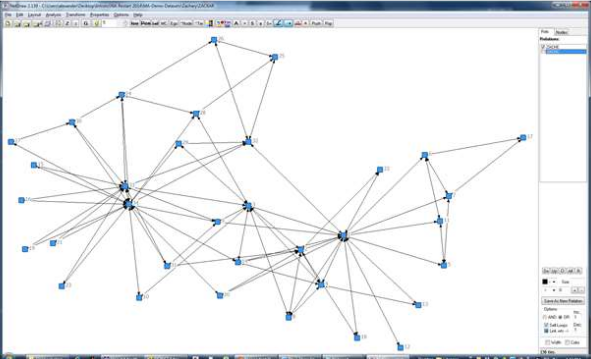
This course covers data collection and research design, visualisation and basic analytic methods used in social network research. It is designed for mixed methods and qualitative researchers.
This course will be co-taught By Assoc Prof. Malcolm Alexander & Dr. Dan Chamberlain.
 Associate Prof Malcolm Alexander is one of Australia’s leading sociologists working in the area of social network analysis and mathematical sociology. He made intensive studies of Australian business elite networks of the 1990s directed to public issues of corporate governance and investor capitalism. In recent years he has developed network analysis in new directions through his focus on 2-mode network mapping and investigations of elite networks in the civic cultures of Australian cities. He has published numerous articles in sociological journals, is the editor of two books and was also an editorial member of the Journal of Sociology and executive member and Treasurer of The Australian Sociological Association.
Associate Prof Malcolm Alexander is one of Australia’s leading sociologists working in the area of social network analysis and mathematical sociology. He made intensive studies of Australian business elite networks of the 1990s directed to public issues of corporate governance and investor capitalism. In recent years he has developed network analysis in new directions through his focus on 2-mode network mapping and investigations of elite networks in the civic cultures of Australian cities. He has published numerous articles in sociological journals, is the editor of two books and was also an editorial member of the Journal of Sociology and executive member and Treasurer of The Australian Sociological Association.
Dr Dan Chamberlain is a Post-Doctoral Research Translation Officer, with the Victorian Collaborative Centre for Mental Health and Wellbeing. He is an accomplished social network researcher, working on projects in education, health, criminology, sociology, public policy, and network governance, with government, industry, and academic partners.
https://scholar.google.com/citations?hl=en&user=T49dtw0AAAAJ
This course is designed for social researchers using qualitative and mixed methods. The course builds from the basic, pioneering methodologies of Social Network Analysis (SNA): survey-based egonet SNA and sociometric, "whole network' SNA, and their extensions to network sensitive ethnographies, community networks, web-based network surveys and research on social media activities. The course reviews the possibilities for working with rich network data from interview or online sources and the unique perspectives that qualitative and social research traditions bring to these tasks. The course explores ways to best manage and explore different kinds of network data in Excel, uses UCINET and NetDraw to produce network diagrams and descriptive statistics. We review other appropriate software related to participants' needs. The course serves as a transition to the associated ACSPRI course 'Big Data Analysis for Social Scientists'.
Network research designs covered in this course are:
- Surveys using ego-centric network (egonet) methods
- Network-sensitive ethnographies
- Sociometric (‘round robin’) ‘whole network’ studies and small group research
- Associational/ Affiliation (‘2-mode’) networks (including ethological studies)
- Cognitive mapping and socio-cognitive mapping (SCM)
For each methodology we consider the best ways to code and manage raw data, the most efficient formats for importing such data into visualisation and analysis software and appropriate measures and statistics for reporting findings. We also discuss the process of relating validated findings to broader research questions (‘meta-inference’), extrapolating them to other settings and associated questions of research design.
Day 1
- Course aims and class introductions;
- Research templates and example datasets;
- Egonet data collection;
- Coding and organizing network data;
- Using NetDraw and UCINET.
Day 2
- Diagrams and data analysis for egonet data;
- Sociometric data and whole network fundamentals;
- Random graph simulations;
- WN data analysis - Cohesion;
- WN data analysis - Centrality;
- Comparing networks.
Day 3
- Working with multiple relations and rich tie data;
- Associational (2-mode) data and analysis;
- (Latent) subgroup detection and in-group/ outgroup modularity;
- Boundaries, hot spots and clusters;
Day 4
- Cognitive Data and socio-cognitive mapping;
- Web-based network surveys and partial sociometric datasets;
- Consultations with instructor
Day 5
Mini-conference: Participants present a short account of the particular project they have worked with through the course.
This course may run in a computer lab, or you may be advised to bring your own laptop with specified software.
We will let you know in advance.
No prior knowledge of social network analysis is required.
Participants should be comfortable with using spreadsheets (Excel), have some social science background and be familiar with discussions of research methods.
- Scott, J. (2013). Social Network Analysis, SAGE Publications.
- Borgatti, S., M. Everett and J. Johnson (2013), Analyzing Social Networks, SAGE Publications.
- Garry L. Robins, Doing Network Research: Network-based Research Design for Social Scientists (2015), SAGE Publications.
- Borgatti, S. P., M. G. Everett, et al. (2002). Ucinet 6 for Windows: Software for social network analysis. Harvard, Analytic Technologies. Manual; User Guide. www.analytictech.com
Q: Was this course run under another name?
A: This course incorporates foundational materials from the previous ACSPRI course 'Introduction to social network research and network analysis'. It has extra materials on web-based data collection and social media research but less discussion of network statistics and modelling.
Q: What is social network analysis?
A: is a strategy for investigating social structures through the use of network and graph theories. It characterizes networked structures in terms of nodes (individual actors, people, or things within the network) and the ties or edges (relationships or interactions) that connect them.
There was a balance between conceptual understanding procedural skills (software tools) and research design/application. The sequence and balance worked very well. (Summer 2019)
This course was fundamental to my research design. (Summer 2019)
This is the complete research method I am using & the course has made it less overwhelming to use. (Summer 2018)
It was excellent getting the overviews & theoretical info first & then apply this to the real data. (Winter 2017)
Will provide a methodology that I can use in a current research project. (Summer 2017)
Course was suitably practical, very valuable much focussed on learning a new analysis package. (Spring 2016)
This has opened a whole new way of thinking about the analysis of my subject matter. (Spring 2016)
Malcolm explains things so well/clearly! (Summer 2016)
New methods for analysis & presenting complex relationships. (Summer 2016)
The instructor's bound, book length course notes will serve as the course texts.
